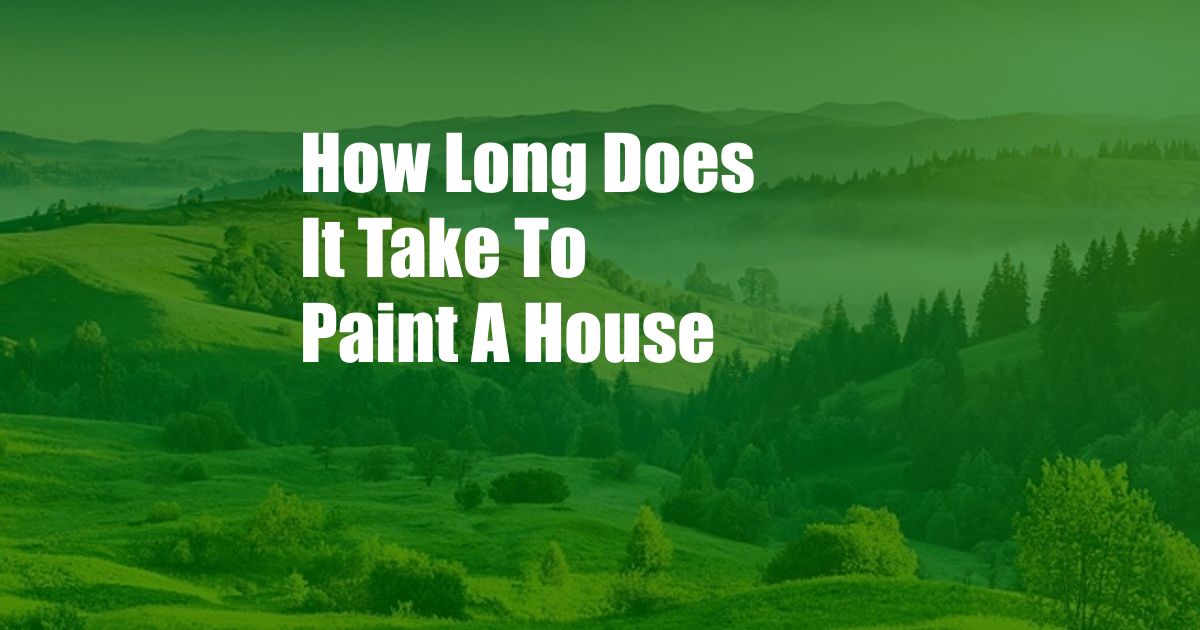
How Long Does It Take to Paint a House? A Comprehensive Guide
Painting a house is a significant undertaking, and the time required can vary greatly depending on factors like the size of the house, the condition of the surfaces, and the experience level of the painter. In this comprehensive guide, we’ll delve into all aspects of painting a house, providing detailed insights into the process, latest trends, and expert advice to help you plan and execute your project effectively.
Whether you’re a seasoned DIY enthusiast or entrusting the job to professionals, understanding the timeline and factors involved will set you on the path to a successful painting project. So, let’s dive right in!
Factors Influencing Painting Time
As mentioned earlier, several factors influence the time required to paint a house:
- Size of the house: Larger houses naturally demand more time for surface preparation and painting.
- Condition of the surfaces: Houses with damaged or deteriorated surfaces require additional time for repairs and priming.
- Experience level: Professional painters can often paint more quickly and efficiently than DIYers.
- Scope of the project: A full-exterior paint job will take longer than just touching up trim or painting a few rooms indoors.
- Weather conditions: Favorable weather allows for faster progress, while rain or extreme temperatures can slow down the process.
Timeline for Painting a House
Based on these factors, here’s a general timeline for painting a house:
- Small house (1,000-1,500 sq ft): 2-3 days for exterior, 3-5 days for interior
- Medium house (1,500-2,500 sq ft): 3-5 days for exterior, 5-7 days for interior
- Large house (2,500+ sq ft): 5-7 days for exterior, 7-10 days for interior
It’s important to note that these are just estimates, and the actual time may vary depending on the specific circumstances of your project.
Latest Trends and Developments
The painting industry is constantly evolving, with new technologies and products emerging regularly. Here are a few notable trends:
- Eco-friendly paints: Paints with low VOC (volatile organic compounds) and sustainable ingredients are becoming increasingly popular.
- Self-cleaning paints: These paints contain special additives that help repel dirt and grime, making surfaces easier to clean.
- Smart paints: Paints with built-in sensors can monitor temperature, humidity, and other environmental conditions.
- 3D printing: This technology is being explored for creating custom paint patterns and textures.
Tips and Expert Advice
To help you achieve the best results, here are some valuable tips and expert advice:
- Plan ahead: Determine the scope of the project, gather the necessary materials, and schedule the work accordingly.
- Prepare surfaces properly: Clean, repair, and prime surfaces before painting to ensure a durable finish.
- Use high-quality paint: Invest in high-quality paint specifically designed for the surfaces you’re painting.
- Apply multiple coats: For best coverage and durability, apply at least two coats of paint.
- Allow adequate drying time: Follow the manufacturer’s instructions for drying time between coats.
FAQs on House Painting
Here are some frequently asked questions about house painting:
- Q: How much does it cost to paint a house?
A: The cost depends on factors like the size of the house, condition of the surfaces, and labor costs. On average, expect to pay around $2,000-$5,000 for a professional exterior paint job.
- Q: Can I paint my house myself?
A: Yes, you can DIY if you have the necessary skills and equipment. However, for larger or complex projects, it’s advisable to hire a professional painter.
- Q: How often should I paint my house?
A: The frequency depends on factors like climate, paint quality, and surface condition. Generally, exteriors should be painted every 5-10 years, while interiors can go 7-10 years between repainting.
- Q: What’s the best time of year to paint a house?
A: Spring and fall offer ideal temperatures and humidity for painting, but avoid extreme heat or cold.
Conclusion
Painting a house is a project that can significantly enhance its aesthetics and protect it from the elements. By understanding the factors that influence painting time, following the expert advice provided, and staying informed about the latest trends, you can plan and execute a successful painting project that meets your needs and expectations. Whether you choose to DIY or hire professionals, a well-painted house will add value and beauty to your home for years to come.
Are you interested in learning more about painting techniques, color theory, or DIY project ideas? Let us know in the comments below, and we’ll be happy to provide additional insights and resources.